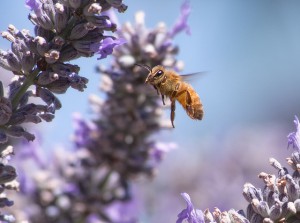Harvard Research Confirms Link between Neonicotinoids and Honeybee Population Decline
A new study published in the Bulletin of Insectology by Harvard researchers found further evidence of the link between neonicotinoid use and Colony Collapse Disorder (CCD), in which bees abandon their hives over the winter and eventually die. This study was led by Professor Chensheng (Alex) Lu, an advisory board member for The Organic Center and Associate Professor of Environmental Exposure Biology at the Harvard School of Public Health. It supports his previous research, which found that 94 percent of hives exposed to low levels of the neonicotinoid imidacloprid died within 23 weeks of exposure. The new study added a second neonicotinoid called clothianidin to their observations. They found that the same negative effects were associated with bee exposure to clothianidin as with imidacloprid. “We demonstrated again in this study that neonicotinoids are highly likely to be responsible for triggering CCD in honeybee hives that were healthy prior to the arrival of winter,” said Dr. Lu.


